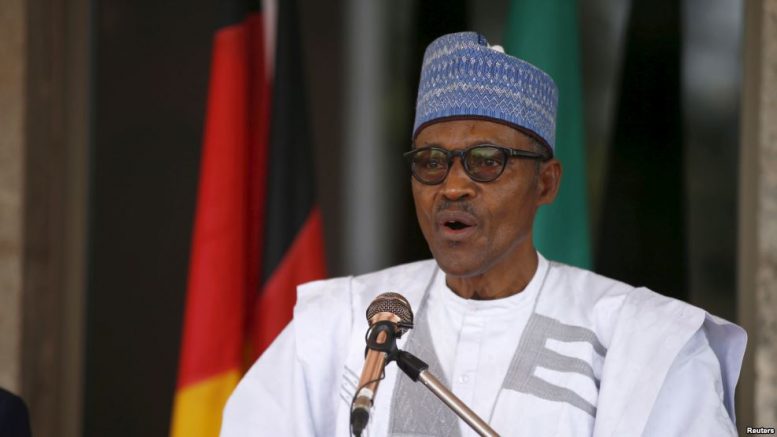Nigerian President Muhammadu Buhari has vowed to bring back citizens who are stranded in Libya and other parts of the world by expanding the country’s socioeconomic programs.
African and European leaders began high-level talks Wednesday on migration, a key issue that has received more attention since the video was disseminated showing what appeared to be West African migrants being sold at a slave auction in Libya, drawing condemnation from around the world.
In reaction to the video, Buhari said it was deplorable that “some Nigerians [in the footage] were being sold like goats for a few dollars in Libya.”
Nigeria’s government said on Twitter that 242 Nigerian migrants returned home from Libya on Tuesday and that more than 4,000 stranded there had “safely returned home” this year.
“It is very important that we simply support Africans to put a stop to illegal migration, so people don’t have to either suffer in horrible camps in Libya or are even being traded,” said German Chancellor Angela Merkel at the beginning of the two-day summit.
French President Emmanuel Macron said leaders of the United Nations, the European Union and African countries, including Libya, were discussing ways of stopping the human traffickers with “concrete, military and police actions on the ground to trace back these networks.”
The leaders also announced that they would set up a special task force to help protect migrants, notably those detained in conflict-torn Libya.
Details of the plan have yet to be worked out.
Burkina Faso’s foreign affairs minister has already recalled his ambassador from Libya, saying it is “unacceptable to have slaves in this 21st century.”
Buhari said his government would reduce the number of Nigerians illegally migrating to Europe through the Sahara Desert and the Mediterranean Sea by expanding domestic education, food safety, and health care programs.

A rubber boat with migrants in the Mediterranean Sea. 193 people and two corpses were recovered from a rubber boat by the MV Aquarius, a search and rescue vessel operated by MSF and SOS Mediterranee. Friday, Jan. 13, 2017. (AP Photo/Sima Diab)

FILE – Samuel, 25, from Nigeria, waits his turn to leave the Golfo Azzurro rescue vessel as it arrives at the port of Pozzallo, south of Sicily, Italy, with hundreds of migrants aboard, rescued by members of Proactive Open Arms NGO, June 17, 2017.
Libya is the primary departure location for mostly African migrants attempting to enter Europe. Smugglers often pack them into unstable inflatable boats that frequently break down or sink.
Europe has struggled to stem the flow of Africans who make the dangerous trek through development aid, tighter border controls, and other means. But many Africans are willing to risk death and abuse to seek jobs or escape conflict.
European Parliament President Antonio Tajani told lawmakers from both continents before the summit that quick solutions must be found to meet the needs of the African population, which he said is projected to double to nearly 2.5 billion people by 2050.
Tajani said Africa must create millions of jobs for young people or they will become disillusioned.
“We will then be facing problems of radicalization, especially in unstable regions such as the Sahel, but also much more widespread migration,” he said.
– VOA

